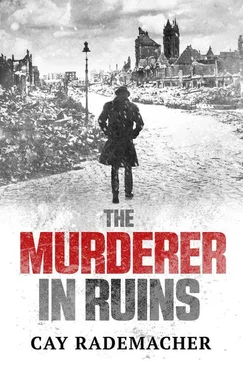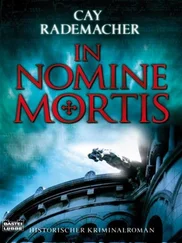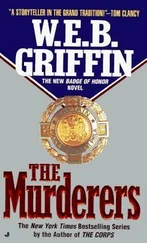Cay Rademacher - The Murderer in Ruins
Здесь есть возможность читать онлайн «Cay Rademacher - The Murderer in Ruins» весь текст электронной книги совершенно бесплатно (целиком полную версию без сокращений). В некоторых случаях можно слушать аудио, скачать через торрент в формате fb2 и присутствует краткое содержание. Год выпуска: 2015, ISBN: 2015, Издательство: Arcadia Books Limited, Жанр: Триллер, на английском языке. Описание произведения, (предисловие) а так же отзывы посетителей доступны на портале библиотеки ЛибКат.
- Название:The Murderer in Ruins
- Автор:
- Издательство:Arcadia Books Limited
- Жанр:
- Год:2015
- ISBN:9781910050750
- Рейтинг книги:5 / 5. Голосов: 1
-
Избранное:Добавить в избранное
- Отзывы:
-
Ваша оценка:
- 100
- 1
- 2
- 3
- 4
- 5
The Murderer in Ruins: краткое содержание, описание и аннотация
Предлагаем к чтению аннотацию, описание, краткое содержание или предисловие (зависит от того, что написал сам автор книги «The Murderer in Ruins»). Если вы не нашли необходимую информацию о книге — напишите в комментариях, мы постараемся отыскать её.
The Murderer in Ruins — читать онлайн бесплатно полную книгу (весь текст) целиком
Ниже представлен текст книги, разбитый по страницам. Система сохранения места последней прочитанной страницы, позволяет с удобством читать онлайн бесплатно книгу «The Murderer in Ruins», без необходимости каждый раз заново искать на чём Вы остановились. Поставьте закладку, и сможете в любой момент перейти на страницу, на которой закончили чтение.
Интервал:
Закладка:
I need to get myself a map of Russia, Stave thought to himself. Find out where Vorkuta is.
A Letter
Tuesday, 18 March 1947
Stave woke up and sensed something had changed. For a second he was afraid there was somebody else in the room. He sat up, looked around. Nobody there. It was only then that he realised what it was that had changed.
Outside a bird was singing. There was no hard sheet of ice across his window, just puddles on the window sill where the frozen patterns made by the frost had melted. He could no longer see his breath, his hands no longer ached, he didn’t automatically shiver, not even when his bare feet touched the floor.
Carefully Stave got to his feet, still not trusting the temperature, made his way to the window and looked out. He could see sunlight. The wall opposite shone a warm yellow. Three or four people were walking along the street, still cautiously wrapped in coats and scarves. One of them dared to take his hat off. When did I last see that, Stave asked himself. An uncovered head in the open air.
He didn’t bother with breakfast, just splashed some water on his face and dashed to the door. Should he take his coat or not? Let’s not be overconfident, he thought and grabbed the heavy woollen thing. He took his gun, shoved it inside his jacket, along with his police ID. But he left his pocket torch lying on the shelf below the clothes hook. Why would he need a torch on such a bright and sunny day?
Out on the street, he felt as if his body was divided in two, with the border somewhere just above his knees. The ground was still frozen solid, and the cold crept up from it. Stave took a deep breath, hoping to inhale the promise of spring: flowers, leaves, grass. But it was still too early for that. The odour of dust, rust and decay still filled his nose, stronger than ever. He unbuttoned his coat, walking slowly, revelling in every footstep. At the street corner people queued in their dozens, tin buckets, jugs, old canisters in their hands, waiting patiently for their turn to fill up whatever container they had with water from a stand pump. These were the unlucky ones whose domestic water pipes had burst over the past few weeks and had since been obliged to get their water from pumps out on the streets. Stave walked past the queue; until yesterday it had been a silent wall of wrapped-up shapes, today he could see faces, hear people talking. From somewhere he even heard a laugh from behind him as he walked along the road. An old man walking towards him doffed his hat in greeting. When he glanced at a passing woman, she blushed and smiled shyly. A couple of schoolboys were kicking a broken cobblestone back and forth, before finally kicking it into the ruins. Survivors, thought Stave to himself, that’s what we are: survivors.
He wondered if the thaw had set in out in Siberia. Or would it still be cold there? With Brems’s help he had located Vorkuta after failing himself to find anywhere of that name on the map of the Soviet Union he had acquired. A dot at the northern end of the Ural Mountains. Far, far away from any town or railway line marked on the map. The chief inspector asked himself how his son might have got there, from Berlin to Vorkuta. He had written a letter to him, sitting over it by candlelight one long night. It had been difficult to find the words. ‘You’re no poet,’ Anna von Veckinhuasen had teased him.
He had not mentioned her to his son. He was too ashamed. He didn’t mention the rubble murderer either. Instead he wrote of Margarethe, memories, described Hamburg, but not in too much detail. He didn’t want to worry his son. General stuff. Only at the end, when he had signed off with ‘Your father’, did he add, as a postscript: ‘I love you and miss you.’
When had he last told his son that? Had he ever? He couldn’t remember having done so.
Survivors, Stave thought to himself again, glancing discreetly at the passers-by on the street, walking as if they’d just been liberated from some camp. If we could survive this winter in Hamburg, why not in Vorkuta too? Karl was young and strong. He would survive. He had to.
It was four weeks since MacDonald had come clean to him about the stolen files, and revealed the existence of Operation Bottleneck. Four weeks since he had found out Maschke’s true identity. Four tough weeks in which nothing else had happened.
But that in itself was something, the chief inspector told himself. There had been no more bodies. Every day with no new spectacular discovery saw the leash he was on lengthen a little. Stave felt he could act a little more freely, as if he had more room to manoeuvre. No new corpse meant no new headline. No popular panic. And no panic had meant no more awkward questions from the mayor, or Cuddel Breuer, or Ehrlich. And now overnight, like a miracle, it was spring. Before long everyone would have forgotten the rubble murderer.
Everyone but me, Stave thought. I won’t.
When Stave got to the office, Erna Berg turned her head away while saying hello to him. The chief inspector stopped for a moment, bent down and looked her in the face. Her right eye was swollen and bruised.
‘Your husband?’ he asked.
She nodded towards her stomach, which was slightly but noticeably distended. ‘I told him. I couldn’t keep it a secret any longer.’
‘I’ll deal with it,’ said MacDonald who had come in from the hallway without either of them noticing.
‘Let’s talk in my office, not out here,’ Stave said.
‘All three of us,’ the lieutenant said, taking Erna Berg’s arm.
‘What do you want to do?’ Stave asked, sitting down at his desk.
Erna Berg sat opposite, MacDonald standing behind with his hands on her shoulders.
‘I want to get divorced,’ the secretary answered.
‘I have already got Frau Berg an apartment,’ the lieutenant said. ‘And when this sorry affair has been dealt with, we’re going to get married.’ He smiled.
‘But you already have a son,’ Stave said. He said no more. The way things stood, a judge would almost certainly give the father custody; it was the mother who had committed adultery.
‘I’ll deal with it,’ MacDonald said. He sounded determined. ‘The boy will grow up living with us.’
The chief inspector stared at him long and hard until he realised that the lieutenant was serious – and that the lieutenant would win. He should have felt sympathy for Erna Berg’s husband, who had lost a leg in the war and now was going to lose his family too. But he had been shocked at the sight of his secretary’s swollen eye. All of a sudden, without intending it, his sympathies had switched to this young British officer who was so polite, so self-confident, so nonchalant, everything that he, Stave, was not.
‘You have my blessing,’ he said.
‘I wasn’t aware you were a pastor,’ MacDonald said.
Stave could see a twitch in the side of Erna Berg’s face that wasn’t swollen. Any minute now she’s going to burst into tears, he realised.
‘Any new developments in the case?’ he asked, before they all went sentimental.
‘No, Chief Inspector,’ his secretary answered, taking a deep breath, pulling herself together and smiling shyly, almost conspiratorially. ‘No new bodies. And no queries from Herr Breuer.’
‘I’m not sure which I was dreading more,’ Stave sighed with relief. Then he lifted his right hand as if he were trying to scare the pair of them away, but the gesture became part blessing, part friendly wave.
‘Take some time off,’ he said. ‘You’ll need time to sort out your new apartment. And I imagine there are one or two other things you need to deal with.’
Within 30 seconds they were gone.
Stave sat there looking at the thin files on the murder case, spread out neatly on his desk. He was beginning to realise that he wasn’t going to get any further. And that he probably never would.
Читать дальшеИнтервал:
Закладка:
Похожие книги на «The Murderer in Ruins»
Представляем Вашему вниманию похожие книги на «The Murderer in Ruins» списком для выбора. Мы отобрали схожую по названию и смыслу литературу в надежде предоставить читателям больше вариантов отыскать новые, интересные, ещё непрочитанные произведения.
Обсуждение, отзывы о книге «The Murderer in Ruins» и просто собственные мнения читателей. Оставьте ваши комментарии, напишите, что Вы думаете о произведении, его смысле или главных героях. Укажите что конкретно понравилось, а что нет, и почему Вы так считаете.











